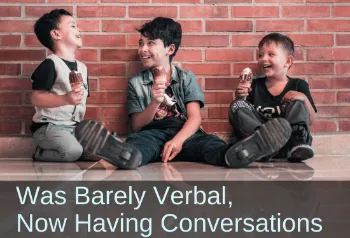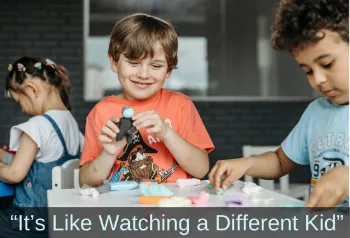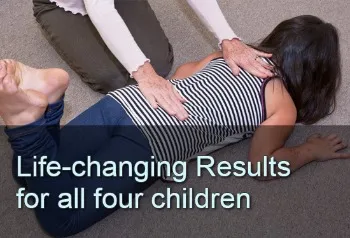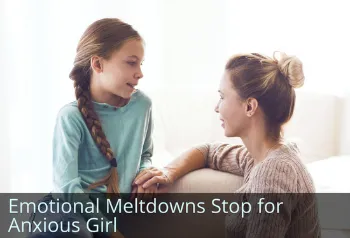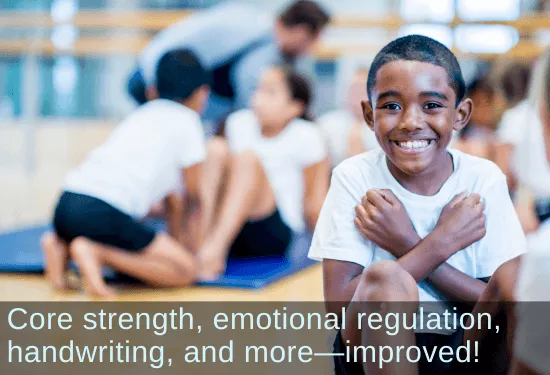Parenting Gets Easier with Neurodevelopmental Movements
While parenting may not be a profession, it is a job, and for most of us, a challenging one. As parents, we are so emotionally and physically invested in our children's well being that parenting can be exhausting—especially when our children are struggling. 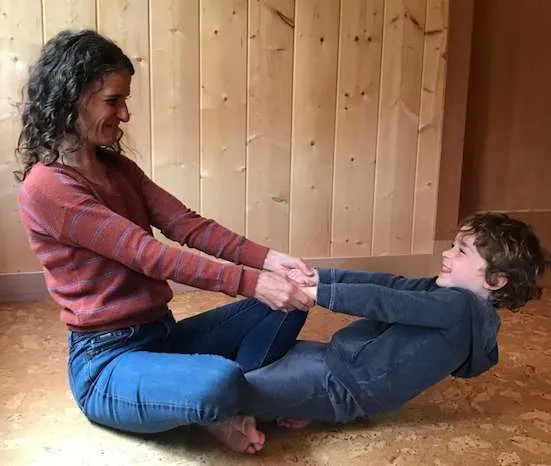
How can we help our children make deep, lasting progress while also helping ourselves be more energized and positive?
This is possible!
"I am seeing more confidence, better sleep, calmer moods, better coordination, more attentiveness and focus. It’s the most progress I have ever seen with my son, and we have tried MANY interventions—every parent should know this program exists.” Andrea A., parent
With the Brain and Sensory Foundations program we learn the innate neurodevelopmental movements of infancy—rhythmic movements, primitive reflexes, and postural reflexes. Neurodevelopmental movements can help progress come more quickly and easily because they directly calm and mature the neuro-sensory-motor systems. These innate movements are especially important for children with challenges because they relax fight-or-flight states and help to build more mature physical, social-emotional, and cognitive skills. See the effectiveness of this unique combination of tools in the stories of transformation below.
We can embrace play and curiosity and move together in enjoyable, targeted ways that work for all ages. Everyone wins and daily life becomes so much easier. Here are two examples:
After just one evening of neurodevelopmental movement, Dylan (13 year old with autism) went to sleep calmly that evening, something he had always resisted in the past. After two weeks, Dylan’s mother wrote about the remarkable changes she had been witnessing:
“When we brush Dylan's teeth he usually pulls his upper lip over his teeth in a protective manner which makes it difficult to clean those front teeth. He usually screams and bites the tooth brush, now he is actually pulling his lip up to expose the teeth and there is no screaming of pain or discomfort. He has less resistance to task requests, more self control, and less reactive behavior.”
In another family, Grady, a six-year old boy, had anxiety and compulsive nail biting that was so severe his fingertips were raw and bloody. His mother did innate rhythmic movements with Grady at night while he slept and in small amounts during the daytime. The movements had a profound calming effect and very soon Grady stopped biting his nails. Within 10 days his fingertips healed and though they were scarred, they were no longer bleeding and raw.
We are experts in primitive reflex integration, so you don't have to be!
Do away with guesswork with our exclusive "Roadmap to Reflex Integration". Along with live support from your instructor, this step-by-step flow chart guides you in the most optimal movement program for each individual family member.
The Brain and Sensory Foundations courses teach the neurodevelopmental movements, combined with play, and other integrative movements to help children release stress and be able to do what is meaningful and enjoyable for them.
You can have fun and make progress at the same time with the right tools and step-by-step guidance.
"I have done other [Primitive Reflex] courses and this, by far, is the most practical and fun for children. The others made me feel like my child was in the military and I was her drill sergeant. I am so very grateful to go back to parenting and yet providing my daughter therapy in a more natural and playful way."
CM, parent"My son just turned 6. After 3 weeks [of doing the movements from the Brain and Sensory Foundations course] I can already see that he is able to calm himself much quicker when he gets mad. Previously he would throw around chairs, now he will give me an angry look, say he is mad, but compose himself and carry on what he is doing. Amazing!”
Cornelia Smit, parent“Thank you so much for creating this program, I have done reflex integration before for my daughter with autism with different modalities and never saw any changes, I started your program little over a month ago and I am seeing progress. I am blown away.” Valentina Guerrini, Parent
Once children receive the neurodevelopmental movements on a regular basis, we often notice:
- Better focus
- Improved sensory processing
- More impulse control
- Emotional regulation
- Improved sleep
- Less anxiety
With these tools you can bring deep benefits to your child while building the most optimal foundation for continued growth and progress.
If you long for a deeper sense of ease and happiness in your daily life as a parent, the Brain and Sensory Foundations course is for you. Be empowered with tools for life-long health and well being for the whole family.
This parent used neurodevelopmental movements to transform her son’s severe communication issues, along with sleep, behavior, and fine motor skills.
Tools from the Brain and Sensory Foundations First Level course helped this 7-year-old boy with separation anxiety gain independence and confidence.
Tantrums, irritability, and anxiety were the norm for this 8-year-old girl. When her mother provided neurodevelopmental movements, emotional outbursts greatly diminished and her sibling relationships improved.
Parent uses rhythmic movements and reflex integration to help 8-year-old son with fine motor, core strength, incontinence, auditory processing, and more!
Parents told there was “no hope” for their son who had a plethora of learning, auditory processing, and language disorders. Using the tools from the Brain and Sensory Foundations course, he became focused, clear-spoken, social, and eventually academically gifted.
See more case studies from parents using primitive reflex integration from the Brain and Sensory Foundations course.
Sonia Story, M.S. has been teaching neurodevelopmental movements since 2006.
Sonia developed the Brain and Sensory Foundations program to provide comprehensive training in neurodevelopmental movements—combining innate rhythmic movements, play, primitive reflexes, and postural reflexes.
She earned a Bachelor's degree in biology/psychology and a Master’s degree in Movement Sciences. She is the author of The Importance of Reflex Integration and the Evidence eBook, giving the rationale and evidence basis for using neurodevelopmental movements for helping with challenges such as ADHD, Sensory Processing Disorders, anxiety, emotional dysregulation, visual skill deficits, poor social skills, gross and fine motor delays and other neurodevelopmental and behavioral disorders.
Her work is featured in numerous podcasts, summits, and conferences, and in the books Almost Autism: Recovering Children from Sensory Processing Disorder; Special Ed Mom Survival Guide; Family Health Revolution; and Same Journey, Different Paths—Stories of Auditory Processing Disorder.
Sonia’s mission is to help children and families experience the profound benefits of neurodevelopmental and integrative movements for more functional and fulfilling lives.


